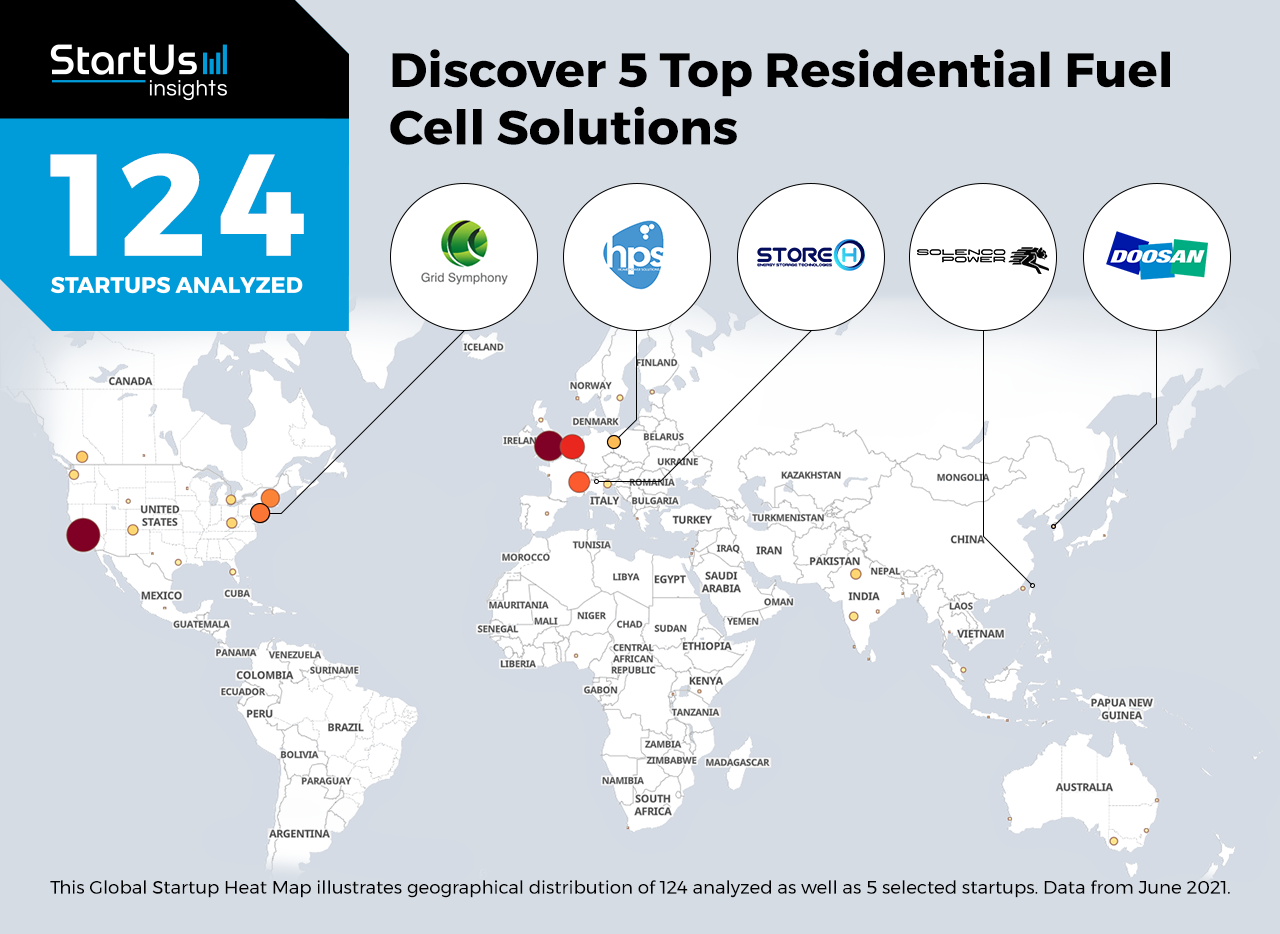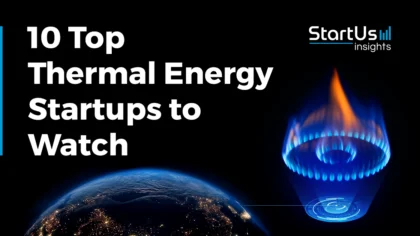Accelerate Productivity in 2025
Reignite Growth Despite the Global Slowdown
Staying ahead of the technology curve means strengthening your competitive advantage. That is why we give you data-driven innovation insights into the energy industry. This time, you get to discover 5 hand-picked residential fuel cell solutions.
Global Startup Heat Map highlights 5 Top Residential Fuell Cell Solutions out of 124
The insights of this data-driven analysis are derived from the Big Data & Artificial Intelligence-powered StartUs Insights Discovery Platform, covering 2.093.000+ startups & scaleups globally. The platform gives you an exhaustive overview of emerging technologies & relevant startups within a specific field in just a few clicks.
The Global Startup Heat Map below reveals the distribution of the 124 exemplary startups & scaleups we analyzed for this research. Further, it highlights 5 energy startups that we hand-picked based on criteria such as founding year, location, funding raised, and more. You get to explore the solutions of these 5 startups & scaleups in this report. For insights on the other 119 residential fuel cell solutions, get in touch.
Grid Symphony develops Fuel Cell Stack for Hydrogen Storage
Fuel cell technology is booming as the energy industry reduces its dependence on fossil fuels and moves towards sustainable energy sources. Fuel cells seem more appealing compared to current rechargeable battery-based solutions as fuel cells can constantly provide power as long as fuel is provided. Since fuel cells also bring other energy benefits such as heating, startups are creating fuel cells to provide clean energy for buildings.
US-based startup Grid Symphony develops a fuel cell stack that converts piped natural gas to hydrogen to feed the cell stack. An electrochemical process within the stack combines hydrogen with oxygen to create DC power, heat, and water. This fuel cell system has a combined heat and power (CHP) efficiency of 90%. Its stackable cell design allows for installation in different types of buildings.
STOREH Energy Storage Technologies offers Hydrogen-On-Demand (HOD)
The consumption of electricity by the residential sector is a large contributor to the global greenhouse gas emission as more fossil fuel-based energy sources are required every year to meet requirements. Wind and solar farms can only be set up in specific areas to produce green energy which limits their benefit for cities. To overcome these, startups are developing small-scale hydrogen energy generation and storage fuel cell systems for houses that use solar or wind as the input fuel to create sustainable hydrogen energy.
Italian startup STOREH manufactures a storage-on-demand hydrogen energy generation and storage device. The device functions by applying the input energy to extract metallic zinc from the electrolyte and produce hydrogen which is then stored or utilized in fuel cells to provide electrical energy. The device is low-cost, scalable, and bridges the energy gap during seasonal fluctuations in energy supply for residential buildings.
Home Power Solutions develops an Energy Generation and Storage Solution
Even though startups and companies provide green energy generation technologies to residents, it is only a temporary measure that still requires powering buildings from the centralized electrical grid. Although this helps to reduce the reliance on fossil fuels, it does not fully solve the energy challenge. Therefore, startups are developing highly efficient and sufficiently powerful home energy generation solutions based on electrolysis to minimize the need for power from the grid.
German startup Home Power Solutions manufactures a high capacity and highly efficient residential green energy system. The startup’s system, picea, comprises a battery, electrolyzer, and fuel cell. It is a sustainable, electrically self-sufficient, and freely dimensional house power system. Additionally, the hydrogen storage system intelligently accumulates solar energy in summer to make it available in winter. Therefore, the solution makes the household almost totally independent from the energy grid.
SOLENCO POWER provides Combined Heat & Power (CHP)
Houses in countries with colder climates consume more energy due to additional internal heating systems. This results in dramatically increased energy consumption from the grid during the winter season, increasing the carbon footprint during those months. Many residential energy systems aim to reduce grid energy consumption but are unable to fully meet the heat and power energy demand. This is why startups are developing CHP fuel cells that provide both heat and power.
Taiwanese startup SOLENCO POWER develops an energy storage system that uses compressed hydrogen gas. Their product, the Solenco Powerbox (SPB) is designed for renewable energy production, energy storage, and energy consumption through electricity and heat in the residential environment. The SPB contains a water tank, power management system, and fuel cells in order to serve as a decentralized source of power.
Doosan Fuel Cell builds Containerized Fuel Cells
As hydrogen fuel cells become more popular as the go-to source of green energy, their scale of applications rises at an exponential rate due to increased investment and development. The current trend of decarbonization of the residential power grid involves equipping each individual house with a fuel cell system. This is generally a laborious and cost-prohibitive method. Startups are developing larger-scale and capacity fuel cell systems that power multiple homes or buildings with a single unit.
South Korean scale-up Doosan Fuel Cell specializes in manufacturing hydrogen fuel cell systems. The startup’s PureCell Model 400 range of containerized fuel cells convert the electrochemical reaction of hydrogen and oxygen to electricity and heat using natural gas, hydrogen, or LPG. The technology has a conversion efficiency of over 90%. Moreover, it produces fewer air pollutants and noise than conventional power plants, making it suitable for residential applications.
Discover more Energy startups
Energy startups such as the examples highlighted in this report focus on CHP, thermal energy storage, and microgrids. While all of these technologies play a major role in advancing the energy industry, they only represent the tip of the iceberg. To explore more energy technologies, simply get in touch to let us look into your areas of interest. For a more general overview, you can download our free Energy Innovation Report to save your time and improve strategic decision-making.








